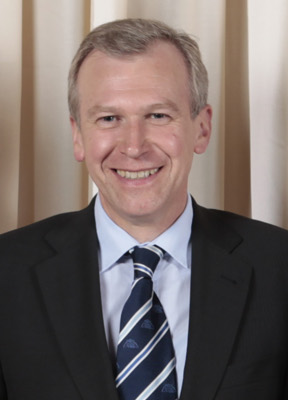Maximilien Sardou
Maximilien Sardou | |
|---|---|
 Sardou in 2019 | |
| First Deputy of Meronnia | |
| Assumed office 17 March 2013 | |
| Preceded by | Justin Beaux |
| Chairman of Faction Liberale | |
| Assumed office 6 April 2011 | |
| Preceded by | Silvain Courtet |
| Secretary of Meronnian Solidarity Bureau | |
| In office 18 October 2008 – 2 March 2013 | |
| Preceded by | Anne-Sophie Donnet |
| Succeeded by | Maryvonne Gardet |
| Maire of Senone Commune | |
| In office 12 January 1991 – 14 January 1999 | |
| Preceded by | William Passereau |
| Succeeded by | Jean-Philippe Affré |
| Personal details | |
| Born | Maximilien Thibaud Lucien Sardou 21 December 1962 Leguine, Meronnia |
| Political party | Faction Liberale (1986–present) |
| Other political affiliations |
|
| Spouse | Clélie Sardou (m. 2007) |
| Parents |
|
| Residence | Palais Gouvernment |
| Alma mater |
|
| Awards | List of honours and decorations |
Maximilien Thibaud Lucien Sardou (born 21 December 1962) is a Meronnian politician who has been First Deputy of Meronnia since 17 March 2013.
Born in Leguine, Sardou studied communications at Leguine Renaudin, later completing a Diplôme (equivalent to a Master's Degree) in Law at Duiselly College, graduating in 1985. He worked as a secretary for the DRSD and later became a civil servant in the Justice Bureau.
Sardou was a successful Dark-Horse candidate in the 1991 Senone Communal elections, becoming the Communal Maire candidate for Faction Liberale after performing better than expected in debates, going on to defeat the incumbent and Faction Radical candidate, William Passereau. During his tenure as President of Senone, Sardou was responsible for significant investments in public transport, as well as progressive justice reform. He gained a reputation as a competent politician during this time for his successes in bringing new Federal funding to programs in the city. Sardou was reelected with a stronger mandate in 1995 and continued pushing progressive reforms through the Communal Assembly.
In 1999, Sardou did not seek reelection as Maire of Senone, accepting an offer of a party list ranking to join Faction Liberale in the national legislative chamber, the Chamber of Deputies. Faction Liberale's success in the 1999 election earned a second term for the Antegono Government, and brought Sardou into the Chamber along with more than thirty other new legislators.
Sardou was a prolific legislator, but after the 2003 election Faction Liberale was left in opposition. Sardou was a candidate for Chairman of Faction Liberale in the 2003 election, but withdrew early into the competition. A year after the 2007 election and the formation of the Radical-Liberale coalition, Sardou gained a cabinet seat when he replaced Anne-Sophie Donnet who had resigned from office as Secretary of the Solidarity Bureau. Sardou's actions in this office have been attributed as a major factor in the rehabilitation of relations between Faction Liberale and Parti Socialiste.
Silvain Courtet resigned as Chairman of Faction Liberale prior to the 2011 election in reaction to poor polling, and Sardou was quickly elected to replace him. Sardou's novel campaigning style which made good use of growing online infrastructure reversed polling trends, though Faction Liberale still returned as a junior partner in government. Over the next several years, a number of crises and government failures discredited Faction Radicale and significantly damaged it's right-wing partners. As a result, in 2013 Sardou opened a vote of no confidence against his coalition partner which passed the Chamber and led to an early election.
In this election, Faction Liberale earned enough support to form a minority government in cooperation with several left-wing parties including Parti Socialiste and Verte, making Sardou the First Deputy, a position reinforced in the regular 2015 election. In the 2019 Federal Election, the governing parties earned enough seats to form an absolute majority, no longer requiring the support of crossbenchers for budgets and acts of confidence.
Sardou's government has been a strong supporter of science and education in Meronnia, including expanded funding to the CNES. It has also invested heavily into improving public transportation, and providing stronger climate policies. Criticisms have been laid at Sardou's government for increases to taxes (including the controversial introduction of a Wealth Tax) and inadequate support of rural communities. According to polling, the government's most popular moves have been their competent response to the 2019-2020 Global Recession as well as a broadly successful foreign policy strategy.